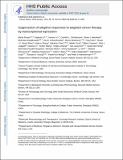Suppression of Adaptive Responses to Targeted Cancer Therapy by Transcriptional Repression
Author(s)
Rusan, Maria; Li, Kapsok; Li, Yvonne; Christensen, Camilla L.; Abraham, Brian J.; Kwiatkowski, Nicholas; Buczkowski, Kevin A.; Bockorny, Bruno; Chen, Ting; Li, Shuai; Rhee, Kevin; Zhang, Haikuo; Chen, Wankun; Terai, Hideki; Tavares, Tiffany; Leggett, Alan L.; Li, Tianxia; Wang, Yichen; Zhang, Tinghu; Kim, Tae-Jung; Hong, Sook-Hee; Poudel-Neupane, Neermala; Silkes, Michael; Mudianto, Tenny; Tan, Li; Shimamura, Takeshi; Meyerson, Matthew; Bass, Adam J.; Watanabe, Hideo; Gray, Nathanael S.; Young, Richard A.; Wong, Kwok-Kin; Hammerman, Peter S.; ... Show more Show less
Downloadnihms915227.pdf (1.388Mb)
OPEN_ACCESS_POLICY
Open Access Policy
Creative Commons Attribution-Noncommercial-Share Alike
Terms of use
Metadata
Show full item recordAbstract
Acquired drug resistance is a major factor limiting the effectiveness of targeted cancer therapies. Targeting tumors with kinase inhibitors induces complex adap- tive programs that promote the persistence of a fraction of the original cell population, facilitating the eventual outgrowth of inhibitor-resistant tumor clones. We show that the addition of a newly identified CDK7/12 inhibitor, THZ1, to targeted therapy enhances cell killing and impedes the emergence of drug-resistant cell populations in diverse cellular and in vivo cancer models. We propose that targeted therapy induces a state of transcriptional dependency in a subpopulation of cells poised to become drug tolerant, which THZ1 can exploit by blocking dynamic transcriptional responses, promoting remodeling of enhancers and key signaling outputs required for tumor cell survival in the setting of targeted therapy. These findings suggest that the addition of THZ1 to targeted therapies is a promising broad-based strategy to hinder the emergence of drug-resistant cancer cell populations. SIGNIFICANCE: CDK7/12 inhibition prevents active enhancer formation at genes, promoting resistance emergence in response to targeted therapy, and impedes the engagement of transcriptional programs required for tumor cell survival. CDK7/12 inhibition in combination with targeted cancer therapies may serve as a therapeutic paradigm for enhancing the effectiveness of targeted therapies.
Date issued
2017-10Department
Massachusetts Institute of Technology. Department of BiologyJournal
Cancer Discovery
Publisher
American Association for Cancer Research (AACR)
Citation
Rusan, Maria et al. “Suppression of Adaptive Responses to Targeted Cancer Therapy by Transcriptional Repression.” Cancer Discovery 8, 1 (October 2017): 59–73 © 2017 American Association for Cancer Research
Version: Author's final manuscript
ISSN
2159-8274
2159-8290